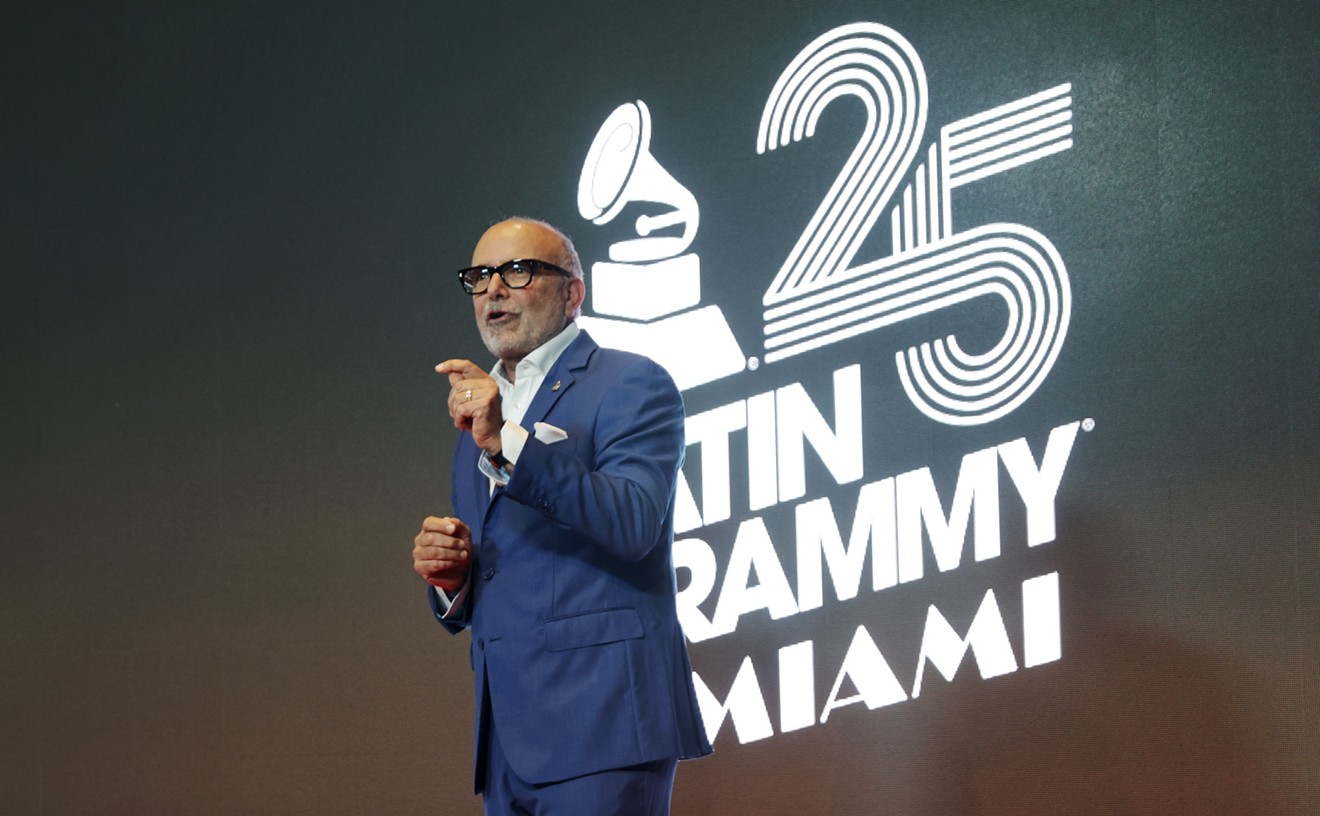Will you recognize me?" Argentine singer and part-time Miami resident Nito Mestre asks New Times during a phone conversation to set up a face-to-face interview. It seems like an odd question. How could we not know him?
He is, after all, one of rock en español's earliest pioneers, and this month he's releasing an autobiographical DVD, Nito Mestre: Completo en Vivo (Delanuca Records, www.delanuca.com): a live concert video showcasing the artist's nearly 40 years in the business. Still, the comment offers a sense of Mestre's humble, down-home aura.
For those who really don't know, Mestre and high school pal Charly Garcia cofounded the progressive rock band Sui Generis in Buenos Aires in 1969. They are considered the Southern Cone counterparts to John Lennon and Paul McCartney. Although Mestre and Garcia went their separate ways at the height of album sales in 1975, the band's work is still lauded throughout Latin America today, and their individual careers keep on rockin' as well.
"When I met Charly in 1966, rock en español didn't exist. We didn't even know how it could possibly sound," Mestre recalls, chuckling. "We always used to say the English language is lucky, because you can easily shorten the words, whereas in Spanish we had to find a way to put the whole thing in there and still fit the music."
They found a winning formula in their native tongue and toured hard around South America for six years, selling a record (for that time) 600,000 albums before trite lyrical censorship by music industry authorities, as well as desires for solo careers, ended the band in 1975. Sui Generis played one last massive concert September 5 that year to a crowd of 30,000 screaming fans at Buenos Aires's Luna Park. The show, as well as the band's breakup, got the press's undivided attention. "There are people who say they were at that show who couldn't have been, but it was so mythical they felt as though they were there," Mestre says.
While Garcia's solo career has continued with a ruckus, Mestre's has taken a more melodious path. It's a vibe you can definitely pick up on the upcoming DVD, where Mestre fuses voice, piano, acoustic guitar, flute, and his distinctively high-ranging voice into a serendipitous journey through classic and folk rock.
Nito Mestre performing at the Gibston Guitar Store in Miami
"These are 25 of the songs that I most loved to play during my career. It's kind of like my ID card," reflects Mestre. Most of the tunes on the DVD are mysterious-sounding numbers, classics such as Sui Generis's "Cuando Comenzamos a Nacer" and his own "El Fin del Mundo" and "Algo Me Aleja." Lyrically and sonically, they delve deep into his feelings, a choice he says marks his emotional maturity.
"I've learned that complex production isn't necessarily better. In 1986, I made this album [Nito] with lots of different rhythms and vocals. It was well done, but I think I did it to show people how good I was," he says. "Emotionally, it's the simple songs that hit me."
Mestre will be playing those, and even a few tangos, during a gathering of friends and fans at Macarena this week. Performing tangos? That certainly wouldn't have happened three decades ago, but Mestre contends the genre has gone through its own maturation process. By the time he was doing rock in the late Sixties and mid-Seventies, tango had become too cliché and commercialized, he says. But lately its gotten back to its own funky, rebellious roots by melding its provocative tempo with rock, electronica, and other styles. "Now more than ever the tangueros and the rockers have something in common," says Mestre. Everyone is fusing, that is.
Nito Mestre in Concert in Bogota this past December 7, with special guest Andres Cepeda
And while he likes to keep his local performances intimate, he also considers himself "everybody's cousin," so he welcomes friends and strangers alike. Looking over his long career, he seems to love most the sense of intimacy between artist and listener. He says that when he was a child, he felt instantly connected to the Beatles the minute he heard them, and thus was comfortable sharing the stage with Paul McCartney in Buenos Aires in the mid-Eighties.
"When people come up to me in Buenos Aires and talk as if they've known me forever, I can understand because that's how I felt when I met McCartney," he says. "I came off the stage and the first thing he asked was: 'How did it go with everyone out there?' And the second question was: 'How do you think they'll do with me?'"
In Miami, Mestre likes the fact that taxi drivers don't hound him about his latest projects. Rather, people here generally ask why his voice sounds so damn familiar. But in both places, he's pleased by the deep emotional bonds fans express when they meet him. "I'm not so impressed with people coming up and telling me: 'Wow, you're a great musician,'" he says, "as I am with people saying, 'You're part of my life. You accompanied me when I felt alone as a child or when I hung out with my friends; and when I moved, I always carried your albums with me.'"










